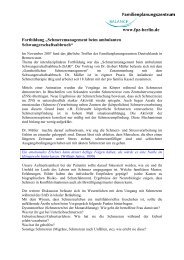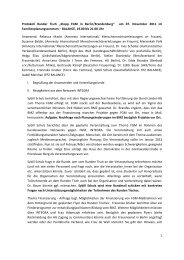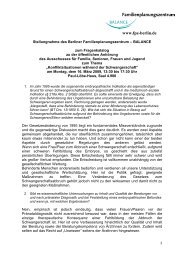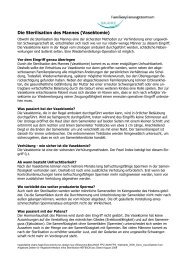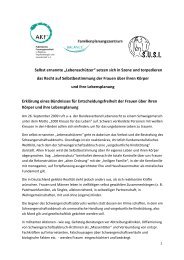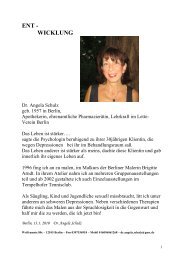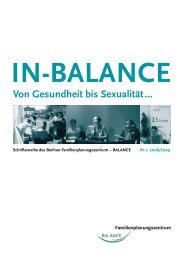Listening to African Voices - FPZ
Listening to African Voices - FPZ
Listening to African Voices - FPZ
You also want an ePaper? Increase the reach of your titles
YUMPU automatically turns print PDFs into web optimized ePapers that Google loves.
5.7.2.4. Low awareness and indifference of menAmong the main practicing groups in francophone West<strong>African</strong> countries, namely the Mandinga, Malinke, Bambara,Dioula and the Fula, FGM/C is considered <strong>to</strong> be “women’sbusiness”. Fathers are often not consulted before a girl issubjected <strong>to</strong> the practice and the act is only communicated<strong>to</strong> them afterwards.“… it depends on the family [who decides on how <strong>to</strong> circumcisethe daughter]. The father is often not informed.It is done by the grandmother who informs only themother without considering the opinion of the girl.” (keyinformant and Dioula of Ivorian origin)The findings from section 5.4 illustrate that a solid proportionof men perceive FGM/C as an advantageous practiceand/or that they have little or no knowledge of how thepractice is carried out and what negative outcomes canderive from it. As a consequence, they don’t take sufficientprecautions <strong>to</strong> protect their daughters even if they arepersonally not interested in seeing the practice continue.Within practicing families, fathers who have poor knowledgeof FGM/C and an indifferent attitude <strong>to</strong>wards it can be considereda risk fac<strong>to</strong>r for daughters even when these fathershave no personal intention of subjecting their daughter <strong>to</strong>the practice.“It is women’s business. My two daughters were circumcisedwithout my being informed. It was only when itwas done that I was <strong>to</strong>ld. My position is that this practiceshould be abandoned.” (man of Burkinabe origin)“I wished for my daughter not <strong>to</strong> be circumcised, but mywife [living in Guinea] and her mother have already doneit. I am here; there is nothing I could have done. Theyonly <strong>to</strong>ld me after they had already gone ahead with theact.” (man of Guinean origin)5.7.3. Are girls of half <strong>African</strong> and half European origin atrisk of being subjected <strong>to</strong> FGM/C?The findings revealed that girl children of “mixed couples”are generally not at risk of being subjected <strong>to</strong> FGM/C. Duringthe data collection, two profiles of immigrants living in arelationship with a European partner appeared:• The highly integrated immigrants, often intellectuals, whoare in most cases married <strong>to</strong> European women of the sameintellectual background. They consider traditional practicessuch as FGM/C <strong>to</strong> be harmful and protect their daughtereffectively from it even if their extended family membersin Africa continue it. Their daughters are not at risk.• The rather poorly integrated migrants, often with noprofession, who engage in a relationship with a Germanpartner frequently with the motive of obtaining a residencepermit. The risk for their daughters can be consideredquasi non-existent as well. Even if the <strong>African</strong> parentis in favour of the practice, he or she is usually aware thatthe European partner would not accept it and insteadreport the case <strong>to</strong> the police. This could endanger thestatus of the residence permit of the <strong>African</strong> parent andat the same time the support given <strong>to</strong> his or her familyin the country of origin. As most immigrants constituteone of the principal sources of income for their families inAfrica, they cannot put their residence status at stake. Oneresearcher put it in very simple words “Papers are alwaysmore important than traditions”. By the same <strong>to</strong>ken, itis unlikely that immigrants would take the risk of loosingtheir children by committing an act considered a crime inthe host country.“They [the daughters of mixed couples] would not beat risk: not here or elsewhere. They will not do it due <strong>to</strong>the fear of losing their children. <strong>African</strong>s, the way I knowthem, will do and agree <strong>to</strong> anything in order not <strong>to</strong> losecontact with their children. Even when some, very fewof them, still believe in it, as long as they are in a mixedrelationship, they will never try it.” (woman researcher ofNigerian origin)• Another aspect of the mixed couple dynamic is that mostchildren with one <strong>African</strong> parent are habitually raised asGermans. They grow up <strong>to</strong>tally detached from their <strong>African</strong>origins. Another researcher summed up her observationsas follows:“Most of these mixed couples actually come <strong>to</strong>getherbecause of immigration issues. The children born as a resul<strong>to</strong>f these relationships or marriages are au<strong>to</strong>maticallyregarded as Germans and not as <strong>African</strong>s or half <strong>African</strong>s.So the <strong>African</strong> culture and traditions do not affect themat all. Very few parents actually allow their daughters<strong>to</strong> have contact with people in Africa, so they rarely go<strong>to</strong> Africa and this means less risk for them.” (womanresearcher of Kenyan origin)The interviews with several participants of half <strong>African</strong>/halfEuropean origin confirmed these observations. All of themshowed interest in the <strong>African</strong> culture and their origins, butperceived themselves <strong>to</strong> be Germans and had learnt aboutFGM/C through the media or the book by Waris Dirie. Justlike any other German, they perceived FGM/C as a violentpractice that has no reason for being.80<strong>Listening</strong> <strong>to</strong> <strong>African</strong> <strong>Voices</strong>






